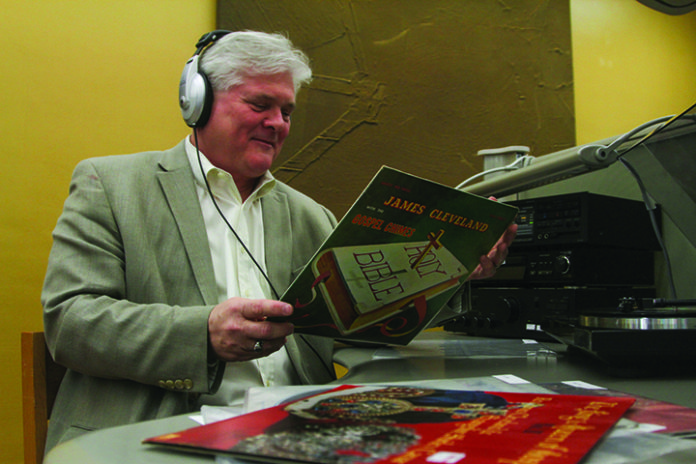
By Joy Moton | Reporter
Professor Robert F. Darden of Baylor’s journalism, public relations and new media department had no idea what to expect as he walked into a sneak preview of the Smithsonian’s newly built National Museum of African-American History and Culture on Sept. 17.
Not only was he excited to see the institution itself, but he anticipated catching a glimpse of his own project that will be featured in the museum. The Black Gospel Music Restoration Project that he has fostered for 10 years will have its own interactive display.
“It’s awesome for Professor Darden, for Baylor, for our department and all the people at Moody Library who have worked so hard to get this whole thing organized and on display so that so many people can enjoy it,” said Margaret Kramer, a charter member of the National Museum of African-American History and Culture.
Darden’s project was designed to preserve Gospel music from the “Golden Age” that would be lost if not for his efforts. Baylor Libraries partnered with Darden to create the Ray I. Riley Digitization Center where submitted vinyls are cleaned, digitized, cataloged and made accessible to the public.
“Being a Christian institution, it just made sense to me that we should preserve this music for future generations,” said Pattie Orr, dean of university libraries.
Darden’s efforts have enabled scholars who study Gospel music and African-American history to have access to the music that has been collected.
“We were able to work with the Pruit Symposium and bring them all to Baylor to discuss their research,” Orr said.
The project has also made it possible for the public to stream 4,000 of these treasured Gospel songs from Darden’s website.
“It’s awesome because if Professor Darden had not done this, then so much of this music and this history would have been lost forever,” Kramer said.
About six years ago, the Black Gospel Music Restoration project caught the attention of Kathy Willis Wright, a well-known lobbyist. Through her connections, Darden was able to present his project to the board of directors at the Smithsonian. There were many people who had exhibits they believed deserved a spot in the museum, but only a few were chosen. Darden’s project was immediately guaranteed a spot.
Even though he knew his project made it into the museum, Darden was not sure how things would play out. He was simply asked to submit 100 songs from his collection.
“We didn’t hear for months and months what [it] was going to be until we got the invitation to go,” Darden said. “So, when I arrived Saturday night, I had no idea what it was going to look or sound like.”
Despite the mystery, Darden was not disappointed as he interacted with the display and heard the very song that clutched his heart from the beginning: “O Ship O Zion.”
“It’s kind of magical because it’s been our theme music, but they didn’t know that,” Darden said. “They just were hit the same way we were.”
Along with seeing his project displayed, Darden was able to witness the impact that the exhibit will have on visitors. As he stood next to his work, various donors tearfully approached him when they discovered his work to preserve Gospel music.
“They would just throw their arms around me and hug me and cry with me, and they would ask me to play [songs] and tell them about them,” Darden said.
Darden also took the time to marvel at other exhibits throughout the museum and grab a T-shirt with the museum’s name on the front. When he wore this shirt, it drew a lot of attention from the residents of Washington, D.C., since the museum will not have its official grand opening until this Saturday.
“They are so proud of that museum,” Darden said. “They said, ‘Tell me about it, tell me it’s as wonderful as I think,’ and people hugged me and thanked me.”
Although Darden’s work has made it all the way to the Smithsonian, he says he is not done working yet. He plans to re-digitize sermons from various legendary pastors. George W. Truett Theological Seminary has partnered with the project to help achieve their goal of someday establishing a center for black music and preaching studies.
“In the meantime, an estimated 8 million people a year will walk through those doors and hear that music and see it and know that it existed,” Darden said.





